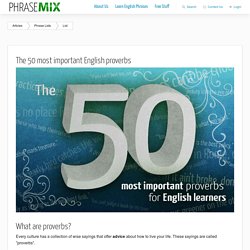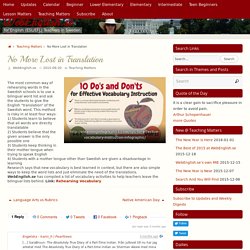

20 engelska ordspråk som alla bör känna till ‹ GO Blog. Ordspråk – Invånare med engelska som modersmål älskar att använda dessa i deras konversationer och du hittar de ofta i böcker, tv-serier och i filmer.

För att förbättra din engelska måste du verkligen bli säker på hur du använder engelska ordspråk och att veta skillnaden mellan till exempel “breaking a leg” och “pulling someone’s leg”. Här kommer 20 engelska ordspråk som alla bör känna till: 1. Under the weather Vad betyder det? Hur använder man det? 2. Vad betyder det? Hur använder man det? 3. ESL Posters. British vs. American English: 63 Differences. LearnEnglish Kids.
Actions. Food. Bathroom. Moving. Vegetables. Weather. A room. Daily routine. Home. Nature. Around town. Kitchen. Body parts. School. Animals. Affect vs. Effect & 34 Other Common Confusions. LearnEnglish Kids. Word of the week. Vocabulary exercises. 10 Illustrated English Idioms That Will Make Your Life Easier.
For many people learning English for the first time it can be daunting and complex language to master.

Lots of silent letters, complex spellings and odd expressions which often go over the heads of most non-English speakers. To make learning English a little easier, Irish illustrator Roisin Hahessy has created some wonderfully simple yet funny pictures to help make things a little clearer. She's also a part-time English teacher in Brazil so she uses the series to aid her students as well.
Now whenever you hear any of these English idioms, thanks to Hahessy at least now you'll have a better idea of where the conversation is heading! Via Roisin Hahessy. Glosmaskin. Tagul - Word Cloud Art. The 50 most important English proverbs. The 50 most important English proverbs What are proverbs?

Every culture has a collection of wise sayings that offer advice about how to live your life. These sayings are called "proverbs". How can you use proverbs to learn English? It's good to know the really common English proverbs because you hear them come up in conversation all the time. You know what they say: when the going gets tough... (Read #5 below to learn the rest of this proverb and what it means.) Learning proverbs can also help you to understand the way that people in English-speaking cultures think about the world. Proverbs can also give you good example sentences which you can memorize and use as models for building your own sentences. The most important English Proverbs This is a list of some of the most important and well-known English proverbs.
The meanings of some of these phrases have shifted over the years, so a proverb might have originally had a different meaning than the one I explain. Print this List. Dose. And drive estate cars Which I will say is much classier than a station wagon.

Rehearsing Vocabulary. Research says that new vocabulary is best learned in context, but there are also simple ways to keep the word lists and just eliminate the need of the translations.

WebEnglish.se has compiled a list of vocabulary activities to help teachers leave the bilingual lists behind. Naming Show a flashcard and let the students write the word (yr 2-4)Word Search with or without the words (yr 2-9)Crossword Puzzle with short clues, synonyms, opposites (or bilingual hints) (yr 3-9)Cloze Sentences Vocabulary in context! You may give 2-3 letters of the missing word to make it easier (yr 3-9) Matching words with their definitions Also: Guess the word from its definition or match the phrases that mean the same. No More Lost in Translation ⋆ Teaching Matters. The most common way of rehearsing words in the Swedish schools is to use a bilingual word list and ask the students to give the English “translation” of the Swedish word.

This method is risky in at least four ways: 1) Students learn to believe that all words are directly translatable 2) Students believe that the given answer is the only possible one 3) Students keep thinking in their mother tongue when trying to speak English 4) Students with a mother tongue other than Swedish are given a disadvantage in learning Research says that new vocabulary is best learned in context, but there are also simple ways to keep the word lists and just eliminate the need of the translations. WebEnglish.se has compiled a list of vocabulary activities to help teachers leave the bilingual lists behind. Link:Rehearsing Vocabulary. BBC Learning English - The English We Speak.